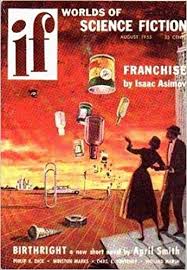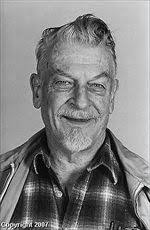The Patriot Page #2
Earth was through with war. And while it is right that man have peace, it is also right that he have freedom. But Mars was in slavery, and to Mars Cornel Lorensse dedicated his life and his talent....
"I came from Mars to get help for my people," he said. "We need guns and supplies, food and oxygen equipment." "You're one of the Charax rebels?" she asked. "Rebels?" He snorted. "We're free people, fighting for our freedom. We want self-government, we want to own our land and our homes, we want the right to rule our own lives." "That's guaranteed in the Constitution," said Meta. "Earth's Constitution. Mars isn't Earth. The Mars Corporation controls both spaceports. It owns all business and industry on Mars. It's milking the planet dry of resources and profits, and it's set up a company government that makes the people of Mars no better than slaves." He smiled a bitter smile. "Earth's government protects the freedom of Earth's people," he said, "but the people of Earth don't know what's happening on Mars. The Mars Corporation has its senators and representatives, bought and paid for, so the Earth government sends troops and supplies to Mars to fight the battles of the Mars Corporation. We aren't rebels, we're fighting for our just freedom." "If the Mars Corporation controls the spaceports, how did you get to Earth?" she demanded. "We have three battered ships hidden in the desert near Syrtis Major," said Cornel. "It takes a long time for us to get fuel to take one of them up, but they thought it worthwhile if I could get to Earth and get help for my people." "Why you?" "My music is well known on Mars, and my people know that the people of Earth love music. Here on Earth, where there is peace and prosperity, people pay to hear good music and good musicians. Our plan was for me to give great concerts and at each concert ask the people of Earth to help their Martian brothers gain their freedom." "A good way to get arrested," said Meta dryly. "You'd be convicted of inciting military action and sentenced to prison in any court of Earth." "I didn't know that, but I suppose the Friends would have a way." "The Friends?" "The Friends of Mars. It's an organization of Earth people trying to help us. I suppose it must be a secret and illegal organization, for I found that the man I was supposed to get in touch with had been arrested, and I haven't been able to find out anything more about the Friends." "Such an organization would be illegal on Earth," said Meta. "Come here, Cornel. I want to show you something." Taking him by the arm, she led him from the breakfast room to a terrace overlooking a snowy valley. She moved closer to him in the chill wind that billowed her thin garments around her, and waved her hand at the scene below them. "This is Earth," she said. "Look at those mountain peaks, the blue sky and the white clouds. In summer, this valley is clothed with green, and warm breezes bring the scent of flowers to this terrace. Have you ever seen anything like this on Mars?" "No," he said softly. "Mars is always cold and dusty, and the sky is nearly black." "Cornel," she said softly, you're a great musician. Mars is rough frontier territory, and the frontier has no place for music. Last night you saw what your music could mean here. "Forget Mars. You belong to Earth." The meteoric rise of Cornel Lorensse to fame in 2011 and 2012 now commands a full column in the Encyclopaedia Terrestriana. Brushed off in a single sentence in the encyclopaedia, but much discussed in that day, was his close relationship with Meta Erosine, his patroness. For half a decade, wealthy, beautiful Meta Erosine had been the toast of Earth. She was an actress, a painter, a singer, a socialite, and she had changed men almost as often as she changed the dresses she wore. Her face was familiar in newspapers and on television screens, her husky songs were on a million recording tapes, her colorful antics were the grist for magazine articles and the subject of denunciations from the pulpit. In Cornel she seemed to have found a vehicle for all the burning fire of her energy. She pushed him, she groomed him, she threw the power of her wealth behind him. His slender figure clad in a black velvet suit sat at polished pianos on a hundred stages; and for each concert, the auditoriums and the audiences were bigger. Meta was with him on these concert tours; and between tours he stayed in seclusion at the big house in Jersi, putting into music his memories of his native Mars. Each tour introduced to the world the new compositions of Cornel Lorensse. What he wrote and played was the haunting music of the deserts, the canals and the marches. Into his music he poured the loneliness of the red sands and the violence of the desert winds, the beauty of sable skies jeweled with enormous stars, the happiness of the helmeted traveler when he reaches the green valleys of the canals, the hopes and joys of human lovers gathered in bubble-like domes amid the chill wastelands. He did not, as Meta had wanted to, give his compositions French titles. He named them as he would have named them on Mars: The Desert Wanderer, Swift Phobos, Marsh Gardens, names that were strange to Earth, but were familiar themes of his own people. His melodies took music-loving Earth by storm. They burst upon a world in which 20th century dissonance had strangled 19th century romanticism, like flowers in a garden of crystal. It was Cornel Lorensse and those pioneer composers who avidly aped him who began the 21st century Renaissance in music. Without shame, Cornel lived on the largesse of his patroness, for his growing fees and royalties all went for one purpose. He had found the society called the Friends of Mars, and everything that he earned he poured into their coffers to finance privateer space vessels able to elude the Mars Corporation's company-owned warships and to keep a thin line of supplies flowing to the Free Martian people scattered in their desert strongholds. Like any secret society in a hostile culture, the Friends of Mars maintained dissociated chapters, connected by the slenderest and most carefully guarded lines of communication. Cornel knew of only one chapter, in Nuyork, and to this he took his contributions when he was between concert tours. During one of those visits, late in the summer of 2012, Javan Tomlin, chief of the chapter, told him that all he contributed was still not enough for Mars to become free. "Our base of support isn't broad enough," said Javan. "Ships cost money, fuel costs money, supplies cost money. Guns and ammunition are most expensive of all, because military weapons are illegal. No one man can support such an operation, even when he makes the kind of money you're making." There were half a dozen of the Friends of Mars, besides Cornel and Javan, in the meeting room. The others nodded agreement at Javan's words. "None of us are wealthy and we can't contribute much but our time and work," said one of them. "The wealthy people all sympathize with the Mars Corporation." "That's too much of a blanket indictment," said Javan. "The Mars Corporation controls the spacelines to Mars, and what little information comes back to Earth is censored and heavily propagandized in their favor. Most people don't know what's happening on Mars. Our people need a powerful radio transmitter to broadcast to Earth, Cornel."
Translation
Translate and read this book in other languages:
Select another language:
- - Select -
- 简体中文 (Chinese - Simplified)
- 繁體中文 (Chinese - Traditional)
- Español (Spanish)
- Esperanto (Esperanto)
- 日本語 (Japanese)
- Português (Portuguese)
- Deutsch (German)
- العربية (Arabic)
- Français (French)
- Русский (Russian)
- ಕನ್ನಡ (Kannada)
- 한국어 (Korean)
- עברית (Hebrew)
- Gaeilge (Irish)
- Українська (Ukrainian)
- اردو (Urdu)
- Magyar (Hungarian)
- मानक हिन्दी (Hindi)
- Indonesia (Indonesian)
- Italiano (Italian)
- தமிழ் (Tamil)
- Türkçe (Turkish)
- తెలుగు (Telugu)
- ภาษาไทย (Thai)
- Tiếng Việt (Vietnamese)
- Čeština (Czech)
- Polski (Polish)
- Bahasa Indonesia (Indonesian)
- Românește (Romanian)
- Nederlands (Dutch)
- Ελληνικά (Greek)
- Latinum (Latin)
- Svenska (Swedish)
- Dansk (Danish)
- Suomi (Finnish)
- فارسی (Persian)
- ייִדיש (Yiddish)
- հայերեն (Armenian)
- Norsk (Norwegian)
- English (English)
Citation
Use the citation below to add this book to your bibliography:
Style:MLAChicagoAPA
"The Patriot Books." Literature.com. STANDS4 LLC, 2025. Web. 22 Jan. 2025. <https://www.literature.com/book/the_patriot_77>.




Discuss this The Patriot book with the community:
Report Comment
We're doing our best to make sure our content is useful, accurate and safe.
If by any chance you spot an inappropriate comment while navigating through our website please use this form to let us know, and we'll take care of it shortly.
Attachment
You need to be logged in to favorite.
Log In